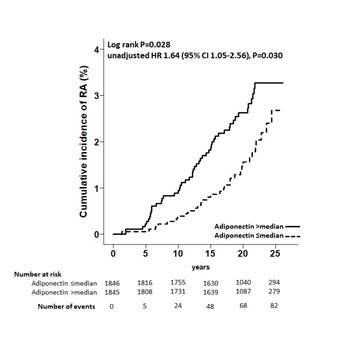Session Information
Date: Monday, October 22, 2018
Session Type: ACR Concurrent Abstract Session
Session Time: 4:30PM-6:00PM
Background/Purpose: Adiponectin, a cytokine mainly produced by the adipose tissue, plays an important role in several metabolic and inflammatory processes. In obese subjects, serum adiponectin levels are surprisingly low and they associate with a higher risk for metabolic diseases, including type 2 diabetes. On the contrary, adiponectin levels are increased in serum and synovia of subjects with established RA. By exploiting a longitudinal study enrolling more than 4000 obese subjects, we aim to determine if serum adiponectin levels are a risk factor for the development of RA in obese subjects.
Methods: The Swedish Obese Subjects (SOS) study is a longitudinal controlled trial on the effect of bariatric surgery on the incidence of obesity-related diseases. It includes 4047 obese subjects whereof 2010 underwent bariatric surgery and 2037 constituted the matched control group. SOS study participants who developed RA were identified by searching the Swedish National Patient Register. Eleven subjects with prevalent RA at baseline are excluded by the analyses. Patients were followed up until diagnosis of RA, death, migration or end of follow-up (December 2016). Total adiponectin was measured using the Quantikine ELISA kit from Quantikine ELISA kit from Bio-Techne (Minneapolis, MN, USA).
Results: Adiponectin measurement at baseline was available for 3691 subjects. Among those subjects, 82 subjects developed RA during a follow up for up to 29 years. High serum adiponectin levels at baseline were associated with the incidence of RA, independently of bariatric surgery, sex, age, body-mass index, smoking, and C-reactive protein and erythrocyte sedimentation rate levels (adjusted Hazard Ratio HR per 10 µg/mL adiponectin 1.70, 95% confidence interval CI 1.12-2.60, P value=0.01). When stratifying the population according to the median of baseline adiponectin, subjects with adiponectin greater than 6.8 µg/mL had a higher risk to develop RA during follow up (log-rank P 0.028, unadjusted HR 1.64, 95% CI 1.05-2.56, P=0.03, Figure 1).
Conclusion: In a large cohort of obese subjects followed up for up to 29 years, serum adiponectin levels were associated with the incidence of RA years before the onset of clinical signs. The association between adiponectin and the incidence of RA is independent of other risk factors, including C-reactive protein, smoking and bariatric surgery.
Figure 1. Cumulative incidence of RA in the SOS study stratified by baseline adiponectin
Abbreviations: HR, hazard ratio; C.I., confidence interval; CRP, C-reactive protein.
To cite this abstract in AMA style:
Maglio C, Zhang Y, Herder C, Rudin A, Carlsson L. High Serum Adiponectin Associates with the Incidence of Rheumatoid Arthritis in Obese Subjects [abstract]. Arthritis Rheumatol. 2018; 70 (suppl 9). https://acrabstracts.org/abstract/high-serum-adiponectin-associates-with-the-incidence-of-rheumatoid-arthritis-in-obese-subjects/. Accessed .« Back to 2018 ACR/ARHP Annual Meeting
ACR Meeting Abstracts - https://acrabstracts.org/abstract/high-serum-adiponectin-associates-with-the-incidence-of-rheumatoid-arthritis-in-obese-subjects/

